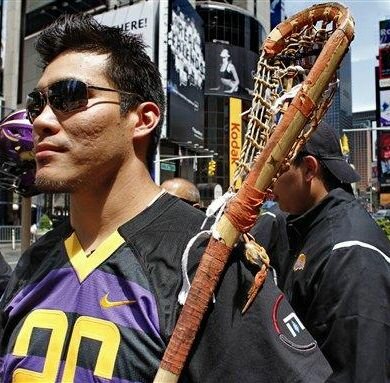The Haudenosaunee right of return
American Indians, Featured, Racial Equity — By Guest Author on July 16, 2010 at 06:00by: Steven Newcomb
For some 30 years, the Haudenosaunee (People of the Longhouse), often known as the Six Nations Confederation, have been accustomed to traveling internationally from and back to North America on Haudenosaunee passports. Now, however, the United States government has evidently taken issue with the Haudenosaunee passports.
As a result, the Iroquois Nationals lacrosse team has been delayed from its scheduled July 11 departure from New York to Manchester, England for the 14-day 2010 World Lacrosse Championships.
The United Kingdom government has refused to grant travel visas to the 23 Haudenosaunee players, because the U.S. Department of State and U.S. Department of Homeland Security have refused to guarantee that the United States will allow the Iroquois Nationals players to return to Haudenosaunee territory by re-crossing the international boundary of the United States.
Even under the George W. Bush administration, the United States government did not attempt to stop the Haudenosaunee from traveling internationally on Haudenosaunee passports. Now, it appears that the U.S. government may have shifted its position. Under President Barack Obama’s watch, it appears that the United States is not going to honor Haudenosaunee passports despite Obama’s statements during his election campaign in Indian country that he was going to respect the nation-to-nation relationship between the United States and indigenous nations, such as the Haudenosaunee.
The United States has treaties with member nations of the Haudenosaunee Confederation and those treaties recognize that a nation-to-nation relationship of peace and friendship exists between the Haudenosaunee and the United States. Furthermore, the Haudenosaunee right to travel to and from their home territory is an ancestral birthright, a fundamental right and an international human right.
It is conceivable that the United States might try to say that the Haudenosaunee players traveling on their own national passports is an issue of
national security for the United States. Yet, to make this argument in any credible manner, the U.S. government would have to explain how Haudenosaunee lacrosse players pose any sort of threat to the United States by traveling on Haudenosaunee passports. There is no such argument to be made because, quite simply put, international travel by lacrosse players on Haudenosaunee passports poses no national security threat to the United States.
The United States government evidently desires to demonstrate a position of authority, dominance if you will, in relation to the Haudenosaunee. To
their credit, the Haudenosaunee chiefs are determined to exercise Haudenosaunee sovereignty by insisting that the Haudenosaunee be able to travel internationally to and from Haudenosaunee territory by crossing and re-crossing the international border of the United States.
A major issue seems to be: Do the Haudenosaunee have a right of return to their traditional homeland and territory after traveling internationally on their Haudenosaunee passports?
There is an even more basic question that needs to be addressed by the people of the United States. Since Sept. 11, 2001, has the United States gradually and steadily moved into a state of fear? Since that fateful day, the government of the United States has failed to heed Benjamin Franklin’s warning: “They who would give up an essential liberty for temporary security deserve neither liberty nor security.”
The Haudenosaunee model of liberty served as a powerful and inspirational model for the British colonists who founded the United States of America. The Haudenosaunee Confederation gave founders of the United States a tutorial on the framework of a democratic republic, and thereby greatly influenced a number of those men who constructed the United States system of government.
In 1987, the United States Congress passed Concurrent Resolution S. 76 <http://www.govtrack.us/congress/bill.xpd?bill=sc110-76>, formally
recognizing the Haudenosaunee contribution to the United States constitutional system. It is ironic, indeed, that the U.S.government – which has been considered by many to be a beacon of liberty in the world – is now moving to restrict the liberty and sovereignty of the very Confederation that inspired many of the founders of the United States.
Are we to understand the United States government, that previously recognized by Senate Resolution the Haudenosaunee contribution to the founding of the U.S. constitutional system, now refuses to recognize Haudenosaunee passports and the right of 23 peaceful Haudenosaunee lacrosse players to return to their home territory?
The Haudenosaunee played a vital role in introducing lacrosse to the world. For them lacrosse is ceremonial, for they consider it to be “the Creator’s game.” How ironic, then, that the United States government may prevent the Haudenosaunee players from competing internationally in a world lacrosse championship.
The United States has already made it virtually impossible for the Haudenosaunee lacrosse players to travel in a timely manner and rest up before
their competition with England’s lacrosse team on July 15. Immediate phone calls to the White House and U.S. Department of State in support of the Iroquois Nationals lacrosse players are in order.
Steven Newcomb, Shawnee and Lenape, is co-founder and co-director of the Indigenous Law Institute, author of “Pagans in the Promised Land: Decoding the Doctrine of Christian Discovery,” and a columnist for Indian Country Today.
Tags: american indian, american indians, Barack Obama, Human Rights, Indian country, native americans, Obama, Politics, Politics News, President ObamaAuthor: Guest Author (106 Articles)


 Share This
Share This Tweet This
Tweet This Digg This
Digg This Save to delicious
Save to delicious Stumble it
Stumble it




